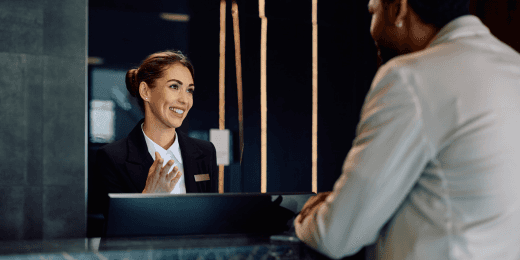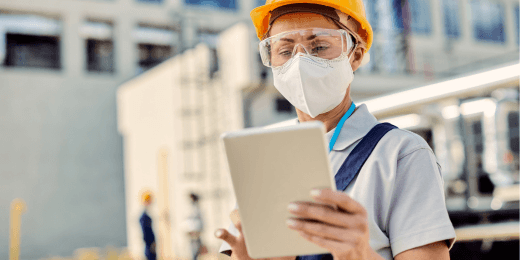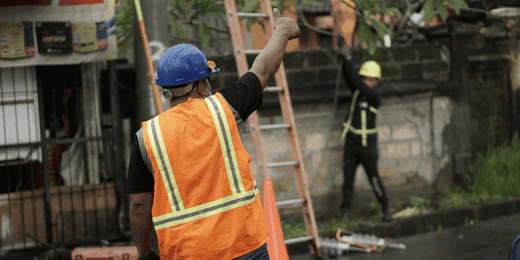Hotel Safety and Security: The Ultimate Guide
Prepare for a safe and worry-free hotel experience for your guests with these helpful tips.

Published 17 Sept 2025
Article by
6 min read
What is Hotel Safety and Security?
Hotel safety and security encompass the measures and protocols to ensure the well-being of guests, staff, and property within the hotel premises. It includes physical security measures like surveillance cameras, secure locks, well-lit corridors, and emergency preparedness plans for fires, natural disasters, or medical emergencies.
Doing so aims to create a safe, secure, and welcoming environment for guests and employees, enhancing the overall experience and maintaining the hotel’s reputation.
Importance of Guest Safety and Security in Hotels
Between 2023 and 2024, the accommodation and food services sector in the UK recorded a non-fatal workplace injury rate of 2,818 per 100,000 workers —higher than the average of 1,668. It highlights the critical need to identify and address common hotel hazards to ensure a safer work environment for their employees.
At the same time, prioritizing guest safety and security offers additional benefits. Some of these include:
Avoid Costly Lawsuits: Accidents or injuries on hotel premises can lead to costly legal fees and payouts if the hotel is found responsible.
Ensure Compliance With Regulations: Hotels are subject to various safety and security regulations, which can result in fines or closures if not followed.
Prevent Financial Loss: Safety and security measures can help prevent theft, vandalism, or other forms of loss that could harm the hotel’s financial stability.
Protect Staff and Employees: Hotel staff and employees also benefit from safety and security measures, as they feel more secure in their workplace.
Strengthen Trust: Hotels that focus on keeping their guests safe and secure are likelier to have happy customers who leave good reviews and recommend the hotel to others.
Maintain a Positive Reputation: A hotel’s reputation is crucial for its success, and good safety and security practices can help maintain this positive image for potential and current guests.
Ensure Business Continuity :Proper safety and security measures can help ensure business operations continue smoothly without significant disruptions in an emergency or disaster.
Make Every Stay a Five-Star Experience
From front desk to housekeeping, get complete business visibility, guarantee guest safety, and help your teams deliver their best work.
Guest Safety Tips for Hotels
Hotels must ensure the safety of their guests, employees, and property by having proper procedures and protocols in place. It includes policies, staffing, and technologies you can use to monitor property and ensure guest safety.
This section will discuss essential safety and security measures every hotel should have.
Ensure Guest Access and Security
An important part of hotel security is controlling access to guest rooms and restricted areas. It means checking locks—traditional keys, swipe cards, or proximity cards—and ensuring everything is accounted for.
Keeping track of spare keys and maintaining a secure inventory of locks helps ensure that only authorized people can enter sensitive areas, improving safety for both guests and staff.
Streamline the Check-In Process
The registration process is essential for guest safety and security, as it keeps accurate records of everyone staying at the hotel. Following data protection policies is crucial to keeping guest information secure, providing a positive experience, and meeting legal requirements. Offering contactless hotel experiences, preferred by 80% of guests, is also an essential part of this process.
Secure Hotel Parking Areas
Parking facilities should be well-lit and clear of obstructions like overgrown bushes or trees. It improves visibility from building entrances and surveillance cameras, helping to keep vehicles safe and accessible. Adding a tracking system for hotel carts or cars can also ensure they are monitored and secure for guest use.
Maintain Exterior Security
The outside of a hotel is just as important as the inside regarding guest safety, as trimming trees and bushes makes the property look better. It improves visibility for security cameras, helping to prevent crime. A well-kept exterior enhances security and shows guests that their safety is a priority.
Install Video Surveillance Systems
Video surveillance systems need to capture clear, high-quality footage. Regularly check camera coverage to ensure all areas are visible and free of blind spots caused by changes in landscaping or interior design.
In addition, make sure CCTV and similar surveillance systems work at their best condition at all times through regular maintenance.
Hire and Train Security Staff
Trained security staff are crucial for keeping your hotel safe. Ensure your team can handle different security situations, whether you use in-house staff or hire an external agency. Regularly updating training and reviewing performance helps ensure they can respond effectively to potential threats.
Ensure Guest Belongings are Safe
Hotel guests trust the hotel to keep their valuables safe, so it’s essential to offer secure storage options like in-room safes or asset lockers. It will give them peace of mind during their stay and can result in a positive guest experience, which can increase the hotel’s reputation. Test the storage regularly to ensure they’re working correctly.
Establish Emergency Protocols
An emergency action plan is essential to ensure both guests and staff are ready in an emergency. Update the plan, as needed, to account for hotel layouts or operations changes, such as renovations or new designs.
Aside from this, here are other measures to keep everyone safe during emergencies:
Test smoke detectors, alarms, and other fire detection systems
Use an automated system to track guest locations during emergencies
Install duress alert systems in key areas like guest rooms and behind the front desk
Ensure backup power systems are in place for uninterrupted service during outages
Implement Health and Safety Protocols
Implementing robust health and safety protocols is crucial for maintaining a safe environment in hotels. This includes measures to prevent accidents, ensure cleanliness, and manage health risks, such as the following:
Establish strict hygiene guidelines, such as frequent cleaning and disinfection of high-touch areas, providing hand sanitizer stations, and ensuring proper ventilation
Regularly inspect floors and walkways for hazards like wet spots or uneven surfaces.
Train staff on recognizing and responding to health emergencies, including CPR and first aid.
Provide guests with information on health and safety practices, such as how to report concerns or incidents.
For example,Butlin’s, a popular UK seaside resort chain, uses a digital operations platform to ensure all its three locations follow safety protocols at all times.
Comply with Safety Regulations
Ensuring compliance with local and national safety regulations is essential for maintaining a secure and safe hotel environment. This involves the following measures:
Stay informed about and comply with all relevant safety and security regulations, including fire safety codes, health standards, and data protection laws.
Conduct regular internal audits to ensure compliance with established safety protocols and regulatory requirements.
Establish a system for reporting and documenting incidents or near-misses.
Improve Hotel Safety and Security with SafetyCulture
Why Use SafetyCulture?
SafetyCulture is a mobile-first operations platform adopted across industries such as manufacturing, mining, construction, retail, and hospitality. It’s designed to equip leaders and working teams with the knowledge and tools to do their best work—to the safest and highest standard. Efficiently manage and streamline health and safety processes across the organization, including incident management, safety audits and inspections, risk assessment, waste management, and more, using a comprehensive manufacturing software solution.
✓ Save time and reduce costs✓ Stay on top of risks and incidents✓ Boost productivity and efficiency✓ Enhance communication and collaboration✓ Discover improvement opportunities✓ Make data-driven business decisions
FAQs about Hotel Safety and Security
Related articles
Environmental Safety
Safety

Stormwater Pollution Prevention Best Management Practices
Learn about the types of best management practices for SWPP and the steps to effectively implement them in prevention plans.
Construction Safety
Safety

Understanding Mechanical Excavation in Modern Construction
Learn about mechanical excavation and how to maintain safety across excavation projects with this guide.
Risk Assessment
Safety

Disaster Recovery Policy: The Ultimate Guide
Discover how a disaster recovery policy bolsters operational resilience and safety through clear procedures and continuous improvement.